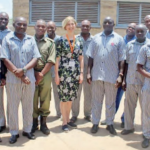Education Cabinet Secretary Julius Ogamba issued a strong warning against exam malpractices during the Kenya Certificate of Secondary Education (KCSE) examination, which began yesterday across the country. Approximately 965,000 candidates are expected to participate in the KCSE, while another 1.3 million will take the Kenya Primary School Education Assessment (KPSEA), starting next week.
Ogamba stressed that any student, teacher, or individual found facilitating exam cheating would face serious legal consequences. He reaffirmed the government’s commitment to upholding the integrity of the examination process, emphasizing that strict measures would be enforced to prevent malpractice.
“Don’t be tempted to cheat. We are vigilant, and anyone caught will be arrested and charged in a court of law,” he warned, highlighting the importance of ensuring that candidates receive results that accurately reflect their hard work.
The CS noted that maintaining the integrity of the certificates is crucial for safeguarding the credibility of the education system and securing the future of students.
He confirmed that all preparations for the national examinations were complete and mentioned that the Ministry of Education is collaborating closely with key stakeholders, including the ICT sector and security agencies, to ensure the safety and credibility of the examinations. This multi-agency approach aims to prevent any malpractices and uphold examination standards.
Ogamba also highlighted the significance of the Competency-Based Curriculum (CBC) in developing well-rounded and skilled students. “The CBC will enable our students to develop a 360-degree capacity, encompassing discipline, practical skills, and academic knowledge,” he stated.
Separately, Kenya National Union of Teachers (Knut) Secretary General Collins Oyuu called on the Kenya National Examination Council (Knec) to take charge of the national examinations and eliminate all loopholes to curb cheating.
“The Union has appealed to the government to ensure that learners and teachers are kept safe in regions which have a history of insecurity,” Oyuu remarked during the Kisii Central Knut branch Annual General Meeting (AGM) yesterday.
Knec has implemented stringent measures to enhance efficiency and maintain integrity, including personalizing examination papers to ensure each is unique to a candidate, rotating supervisors, and banning phones for invigilators, center managers, and candidates during the exams.
Ban discos
In Machakos county, a church leader called on Knec to ensure the examinations run smoothly. Bishop Meshack Mukwilu of the Africa Brotherhood Church said irregularities affected the country’s education system negatively and should be avoided.
“I call upon Knec to take all steps necessary to ensure smooth running and credibility of the 2024 national examinations by involving all the stakeholders including the candidates, parents, the public and media so to prevent cases of cheating during exams periods,” Dr Mukwilu told People Daily yesterday by phone.
While wishing candidates sitting the exam the best of luck, saying that he is praying for God’s blessings to be upon them, Dr Mukwilu also asked the government to ban discos during exam periods across the country.
While speaking in Kwale County, CS Ogamba revealed that the government aims to complete the construction of Grade 9 classrooms by December. He said of the 16,000 planned classrooms, 3,500 have already been finished.
“The construction of the remaining classrooms will begin soon and is expected to take about six weeks,” said Ogamba.
Ogamba expressed satisfaction with the work done so far, noting that the majority of contractors across the country are on track. He said that the government is working tirelessly to ensure the classrooms are completed within the given time frame, reaffirming the commitment to accommodate students when schools reopen in January.
He made the remarks while touring Kwale County to assess the progress of the ongoing Grade 9 classroom construction.
“Parents should not worry. The transition will be smooth and effective because we are working day and night to finish the classrooms,” he added.
Additionally, Ogamba announced that 66,000 teachers have been trained to assist in teaching Junior Secondary School (JSS) students. He said that the re-tooling programme aims to enhance teachers’ knowledge and skills, helping to address the shortage of qualified educators for JSS.
The Education CS revealed that the process to absorb 46,000 intern teachers into permanent and pensionable positions is ongoing. He stated that 20,000 more JSS intern teachers would be hired to strengthen the workforce.



